N100 Mini PC homeserver build
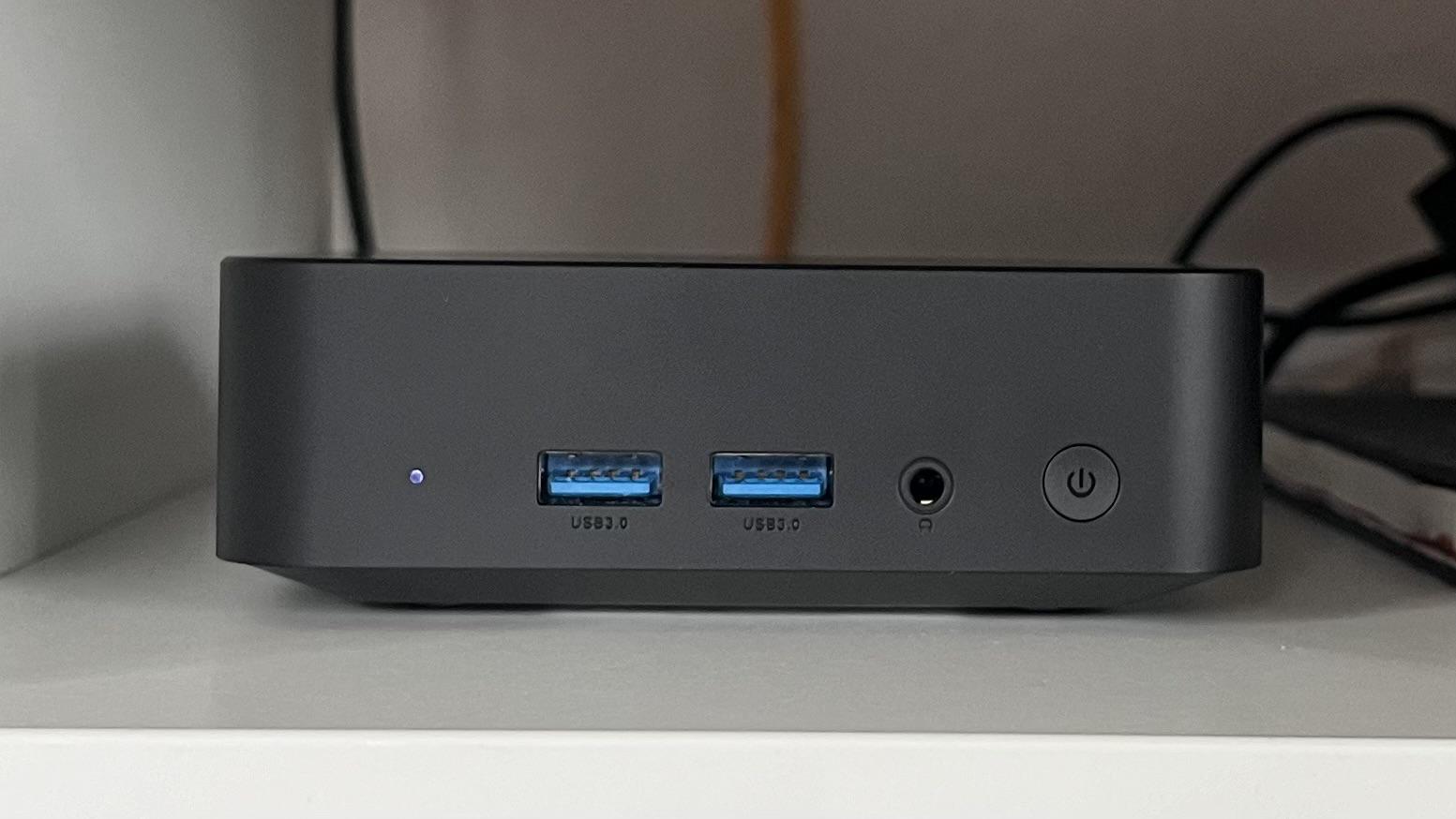
A few years ago I got into the home server building habbit. I started with a typical tower PC during my student years but after moving around a lot, needed something more portable. As energy efficiency was also a criteria for me, I decided to build everything based on a RPI setup. It turned out I could run most of my needs back then on a RPI 4 with 4GB of ram.
Several years have gone by and my RPI + USB-C 4 Disk JBOD array have served me well. I have been using MergerFS + SnapRaid for a few years now and recently also migrated the Pi away from Debian to my personal favorite OS, Arch Linux (more precisely Manjaro ARM). However, the capacity of the Pi is now reaching its limits and I started looking towards a more capable replacement. I wanted to keep the energy efficiency and portability of the Pi, but also wanted to have more CPU power and RAM. I also wanted to keep the JBOD array, as I have been very happy with it.
I do believe the vast majority of households would be completely fine with the setup I am about to describe below. It can easily handle several movie streams, run an entire home automation stack and even act as a storage server for security cameras.
I recently moved to a city with 1Gbit symmetric fiber internet, so I can also for the first time consider hosting large data volume services such as a movie library or a self-hosted Nextcloud + backup solution for phones and laptops. Of course I still need to perform off-site backups of the most critical pieces of information, but in the case of a catastrophic event in my apartment, I’ll survive loosing my collection of Stargate SG1 episodes.
Target Setup
I will remain minimalistic with my setup, relying on 3 core components:
- A N100 / 16GB DDR5 / 256GB SSD Mini PC
- My existing 4 bay 3.5" JBOD USB-C disk array connected via USB-C
- A remote backup location, e.g. backblaze
Setting up
Unfortunately, the usual USB boot did not work as I had anticipated. For some reason, as others had also shared online, my mini PC too did not support USB booting for some obscure reason.
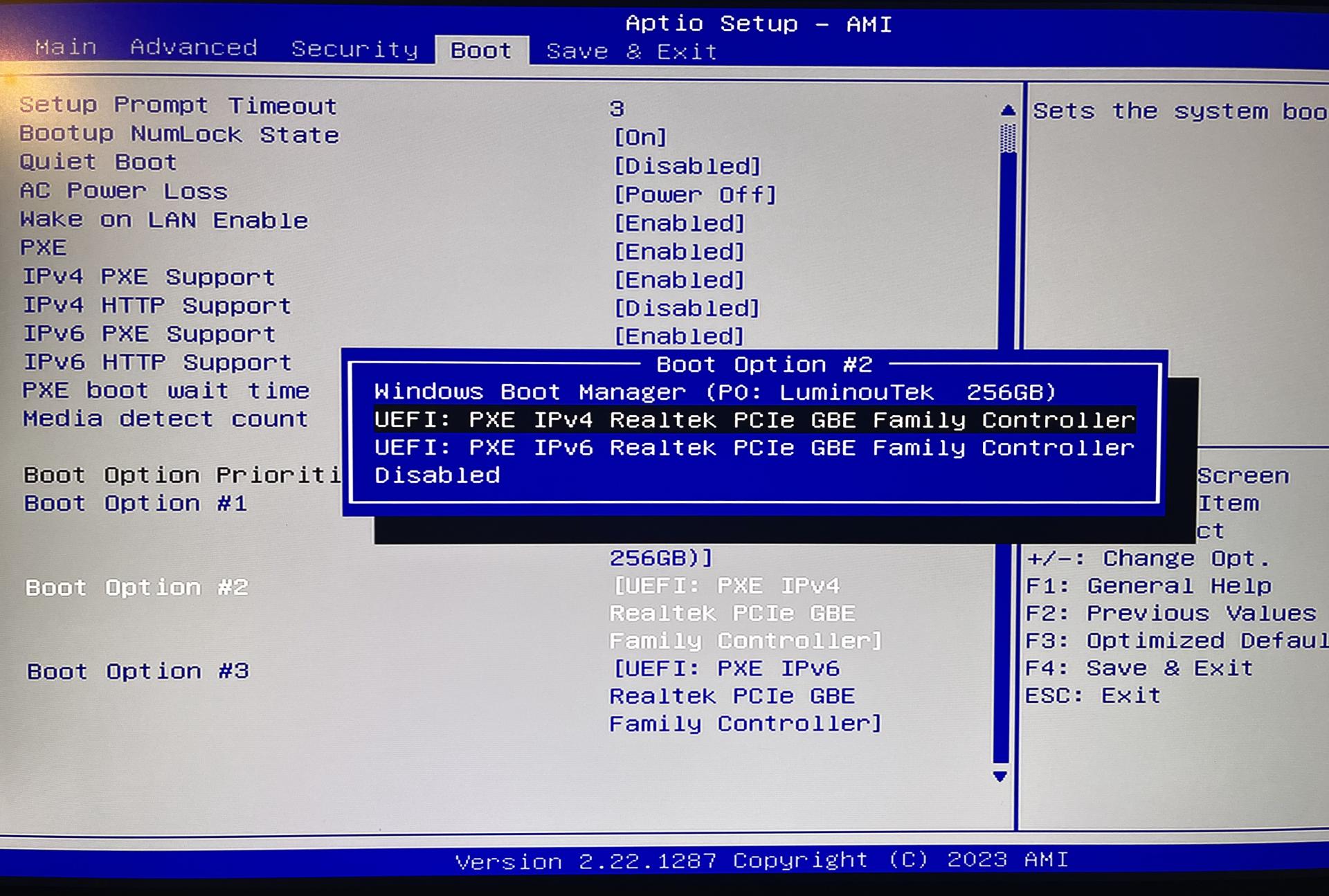
It may have been the fact that I used an SSD as a boot device but ultimately, it was all I had so I looked into PXE. Turns out there is an awesome project netboot which allows you to boot into a PXE environment. I went ahead and set up a PXE host on my EdgeRouter and was able to boot into the netboot environment. Bonus points for being able to boot into a variety of OSes, including Arch Linux for any machine I may need to install in the future.
Netboot
To enable netboot I rand the below:
# run on my edge router to set up
sudo mkdir /config/user-data/tftproot
sudo chmod ugo+rX /config/user-data/tftproot
configure
set service dns forwarding options enable-tftp
set service dns forwarding options tftp-root=/config/user-data/tftproot
commit
save
# download the netboot files
sudo curl -o /config/user-data/tftproot/netboot.xyz.efi https://boot.netboot.xyz/ipxe/netboot.xyz.efi
sudo chmod ugo+r /config/user-data/tftproot/netboot.xyz.efi
# configure the bootfile configs
configure
set service dhcp-server global-parameters "option client-arch code 93 = unsigned integer 16;"
edit service dhcp-server shared-network-name LAN subnet 192.168.1.0/24
set bootfile-server 192.168.1.1
set bootfile-name netboot.xyz.efi
commit
save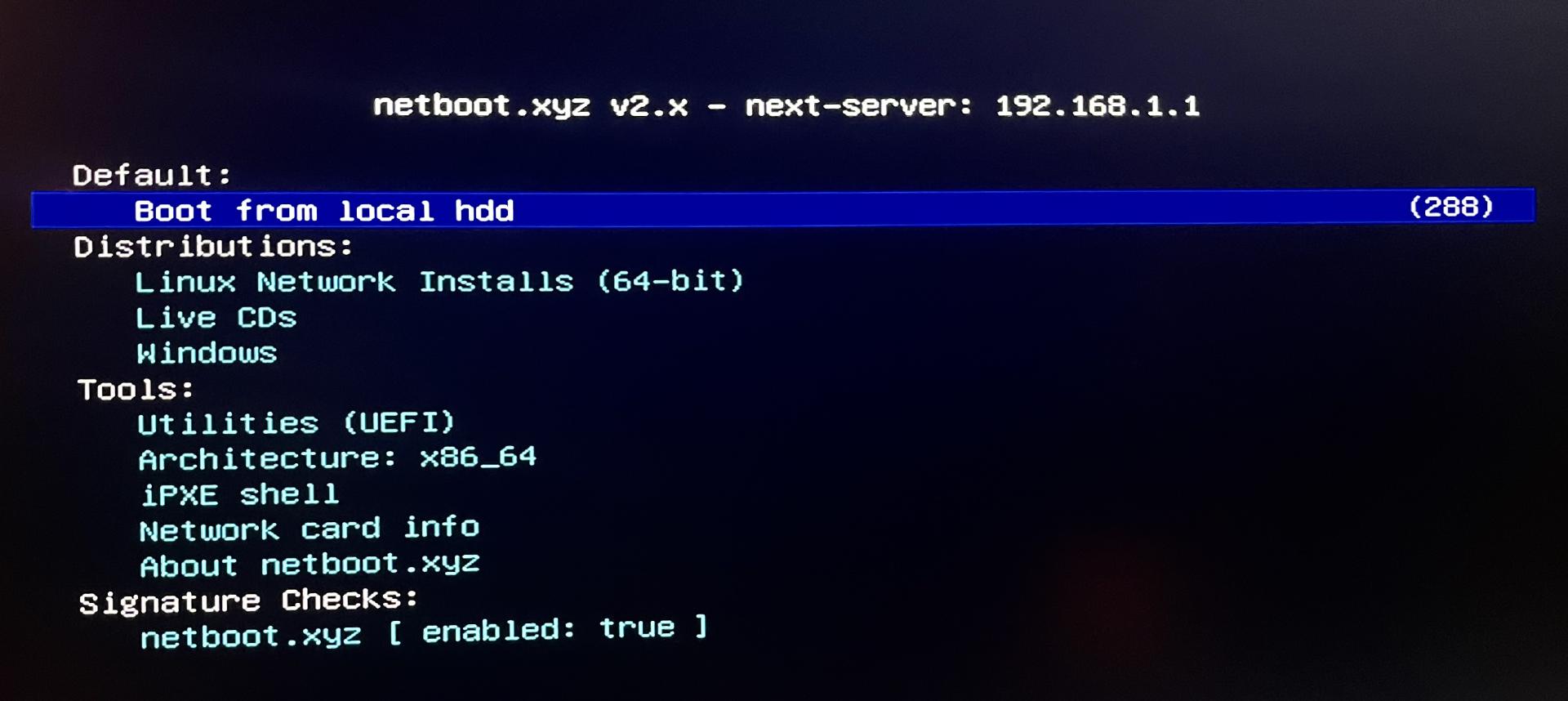
Setup of Arch Linux
Because Netboot doesn’t offer Manjaro, I simply installed Arch instead. Ultimately, all I need is an arch base with yay.
For that I followed the arch installation guide
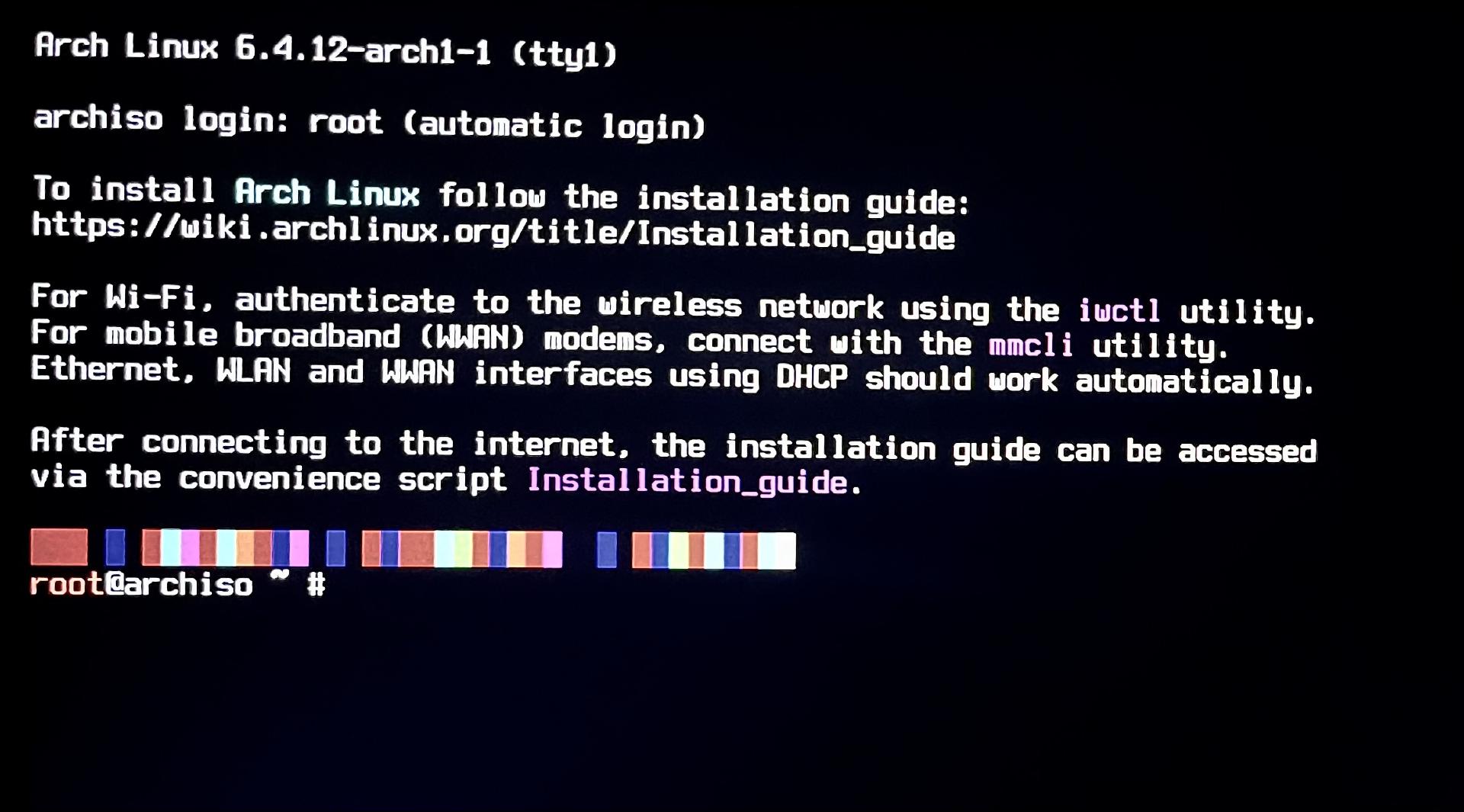
The high level steps were:
- partitioning
- users & groups
- setting up ssh
- installing NetworkManager
- Setting a static IP in my router
Installing standard libraries
After a reboot, I could get started setting up the machine.
I happened to have an existing script lying around from a while ago which ought to bootstrap my machines. This was written for debian and was meant mostly to get me set up on numerous cloud instances. However, that was based on apt & brew so a lot of tweaks were necessary since manjaro with its yay package manager is much easier to set up.
# install core requirements
yay -Syu tmux htop bmon fzf wget curl stow ranger dust duf tig fd lsd docker-compose docker python github-cli inetutils bottom tldr exa dust jq dog fuse2 hd-idle-go# get dotfiles mounted
git clone https://github.com/pascalwhoop/dotfiles
cd dotfiles
# stow all the things
cat linux.stows | xargs -I {} stow -t ~ {}
mkdir -p code/
cd code/
# set up private SSH key for Github
gh auth login
git clone https://github.com/pascalwhoop/dotfiles_private
cd dotfiles_private
# stow all the things
cat linux.stows | xargs -I {} stow -t ~ {}# set up fish
yay -S fish
# oh my fish
curl https://raw.githubusercontent.com/oh-my-fish/oh-my-fish/master/bin/install | fishSetting up MergerFS and SnapRaid
Setting up my existing disks was again really simple. Copy over the fstab and snapraid config and I was good to go.
mkdir -p /mnt/mergerdisk{1,2,3} /mnt/parity1 /mnt/vault
cp pascalwhoop@pi:/etc/fstab /etc/fstab
systemctl daemon-reload
mount -a
cp /mnt/vault/Backup/Raspberry/etc/snapraid.conf /etc/snapraid.confsudo mergerfs -o category.create=mfs,nonempty,defaults,allow_other,minfreespace=50G,fsname=mergerfs /mnt/mergerdisk1:/mnt/mergerdisk2:/mnt/mergerdisk3 /mnt/vault
# Static information about the filesystems.
# See fstab(5) for details.
# <file system> <dir> <type> <options> <dump> <pass>
# /dev/sda2
UUID=26f131a3-5a54-4260-ad2d-d16c09f7893e / ext4 rw,relatime 0 1
#mergerfs setup
UUID=fb91d7ff-088f-49ed-a191-892fcf204823 /mnt/mergerdisk1 ext4 defaults,nofail 0 0
UUID=38010ff4-0ab9-45b0-a1cd-b43b2df6ecf4 /mnt/mergerdisk2 ext4 defaults,nofail 0 0
UUID=03234061-ec5f-417a-8140-5ed8587e2ae5 /mnt/mergerdisk3 ext4 defaults,nofail 0 0
#parity
UUID=e311ff2f-0937-44c6-99d2-225ab626f7d6 /mnt/parity1 ext4 defaults,nofail 0 0
# merging 3 disks into 1 virtual FS
#/mnt/mergerdisk1:/mnt/mergerdisk2:/mnt/mergerdisk3 /mnt/vault fuse.mergerfs category.create=mfs,nonempty,nofail,defaults,allow_other,minfreespace=50G,fsname=mergerfs 0 0
/mnt/mergerdisk* /mnt/vault fuse.mergerfs category.create=mfs,cache.files=partial,dropcacheonclose=true,nonempty,nofail,defaults,allow_other,minfreespace=50G,fsname=mergerfs 0 0
#/mnt/mergerdisk* /mnt/vault fuse.mergerfs category.create=mfs 0 0Before the expansion:
⋊> pascalwhoop@homeserver ⋊> /e/systemd duf
╭────────────────────────────────────────────────────────────────────────────────────────────────╮
│ 5 local devices │
├──────────────────┬────────┬───────┬────────┬───────────────────────────────┬──────┬────────────┤
│ MOUNTED ON │ SIZE │ USED │ AVAIL │ USE% │ TYPE │ FILESYSTEM │
├──────────────────┼────────┼───────┼────────┼───────────────────────────────┼──────┼────────────┤
│ / │ 232.7G │ 14.9G │ 205.9G │ [#...................] 6.4% │ ext4 │ /dev/sda2 $$│
│ /mnt/mergerdisk1 │ 1.8T │ 1.6T │ 66.1G │ [##################..] 91.3% │ ext4 │ /dev/sde1 │
│ /mnt/mergerdisk2 │ 1.8T │ 1.7T │ 0B │ [##################..] 94.9% │ ext4 │ /dev/sdc1 │
│ /mnt/mergerdisk3 │ 1.8T │ 1.7T │ 42.3G │ [##################..] 92.6% │ ext4 │ /dev/sdd1 │$$
│ /mnt/parity1 │ 1.8T │ 1.8T │ 44.5G │ [###################.] 97.6% │ ext4 │ /dev/sdb1 │
╰──────────────────┴────────┴───────┴────────┴───────────────────────────────┴──────┴────────────╯After the expansion:
⋊> pascalwhoop@homeserver ⋊> ~/c/curiloo.com on main ⨯ duf
╭──────────────────────────────────────────────────────────────────────────────────────────────────╮
│ 6 local devices │
├──────────────────┬─────────┬────────┬────────┬───────────────────────────────┬──────┬────────────┤
│ MOUNTED ON │ SIZE │ USED │ AVAIL │ USE% │ TYPE │ FILESYSTEM │
├──────────────────┼─────────┼────────┼────────┼───────────────────────────────┼──────┼────────────┤
│ / │ 232.7G │ 140.8G │ 80.0G │ [############........] 60.5% │ ext4 │ /dev/sda2 │
│ /mnt/mergerdisk1 │ 3.6T │ 1.9T │ 1.5T │ [##########..........] 51.9% │ ext4 │ /dev/sde1 │
│ /mnt/mergerdisk2 │ 3.6T │ 1.9T │ 1.5T │ [##########..........] 52.5% │ ext4 │ /dev/sdb1 │
│ /mnt/mergerdisk3 │ 3.6T │ 1.9T │ 1.5T │ [##########..........] 53.0% │ ext4 │ /dev/sdc1 │
│ /mnt/parity1 │ 3.6T │ 1.8T │ 1.6T │ [#########...........] 49.6% │ ext4 │ /dev/sdd1 │
╰──────────────────┴─────────┴────────┴────────┴───────────────────────────────┴──────┴────────────╯To transition between disks, I had to do a bit of a dance which took a few days. I could at most swap out 2 disks in any one go,
since I needed to transfer all the data, meaning I needed both disks to be online at the same time. Also, while I could have done a
dd raw copy, I decided to do a file-system level copy to minimise issues with sector alignments. I wanted maximum performance out
of the new disks.
So the steps were
- insert 2 new disks, keep the most likely to fail ones in,
fdiskcreating partitions,mkfs.ext4formatting the partitions, mounting- perform an
rsyncfrom OLD to NEW (2 copies in parallel in a tmux with abtmmonitoring the disk IO) - swap out UUID’s in the fstab
- repeat for the other 2 disks
- re-mount the mergerfs disk
- run a snapraid sync
- run a full scrub
This took a few days but the result is ~ 4.5TB of fresh space. Of course an enterprise setup would have required much less labor and no downtime, but it also would have cost me a lot more hardware and energy consumption.
Spinning down disks on idle
As I had already installed hd-idle-go earlier, I was able to simply activate it by
editing the file /etc/defaults/hd-idle and setting START_HD_IDLE=true.
sudo systemctl enable hd-idle --nowNow my disks spin down after 10 minutes which means most of the time, the disks only consume their standby power.
Setting up Grafana monitoring
For monitoring I use Grafana. As such, I installed an agent and configured it to talk to
my grafana.com cloud instance. The point of monitoring is that an independent system
monitors my server. I chose to install the agent via yay instead of the bash command
because I prefer manage all my packages via the proper package manager.
yay -S grafana-agent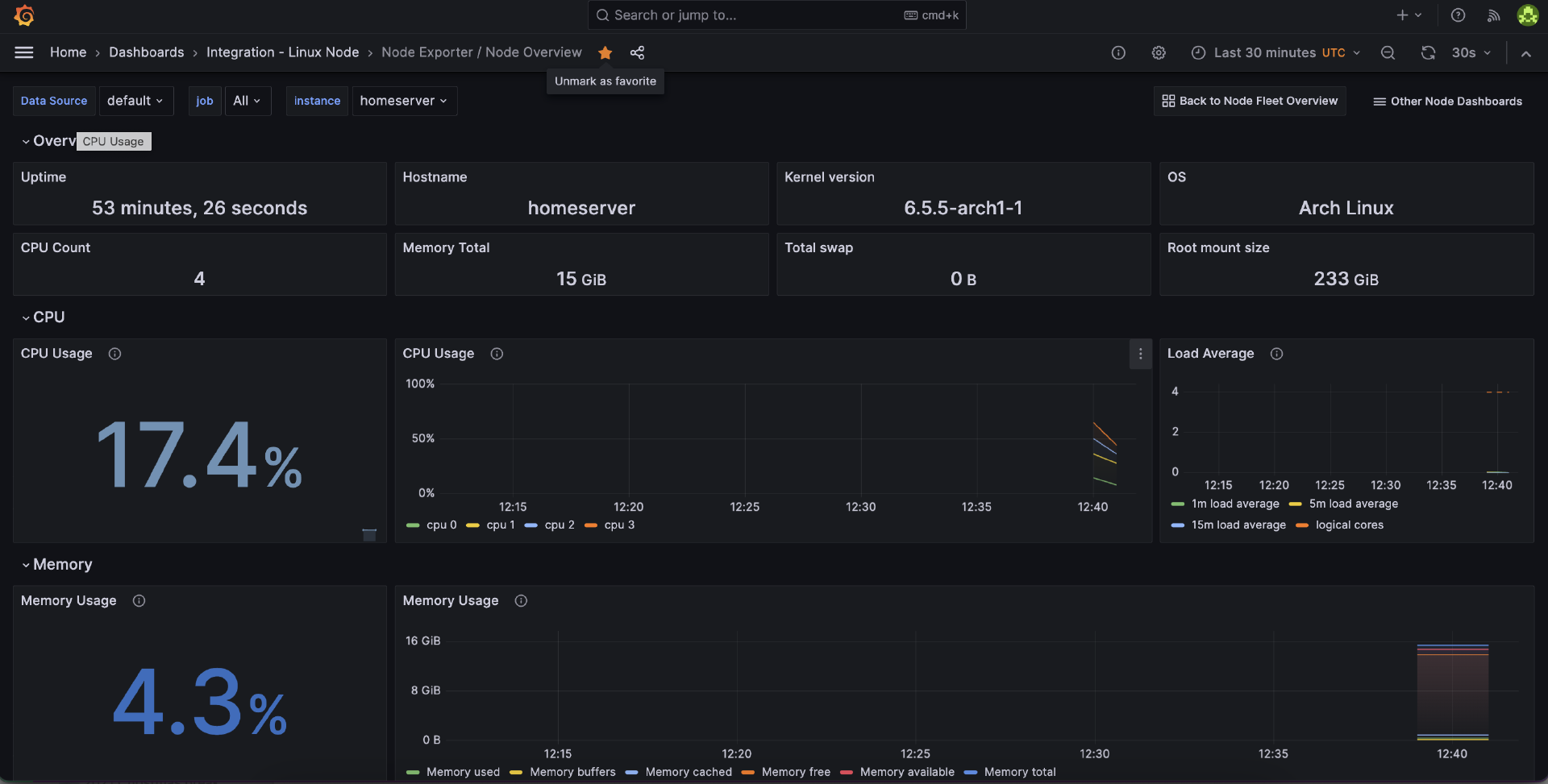
/etc/grafana-agent.yaml
integrations:
prometheus_remote_write:
- basic_auth:
password: <<PASS>>
username: 1011021
url: https://prometheus-prod-01-eu-west-0.grafana.net/api/prom/push
agent:
enabled: true
relabel_configs:
- action: replace
target_label: instance
source_labels:
- agent_hostname
- action: replace
target_label: job
replacement: "integrations/agent-check"
metric_relabel_configs:
- action: keep
regex: (prometheus_target_.*|prometheus_sd_discovered_targets|agent_build.*|agent_wal_samples_appended_total|process_start_time_seconds)
source_labels:
- __name__
# Add here any snippet that belongs to the `integrations` section.
# For a correct indentation, paste snippets copied from Grafana Cloud at the beginning of the line.
node_exporter:
enabled: true
# disable unused collectors
disable_collectors:
- ipvs #high cardinality on kubelet
- btrfs
- infiniband
- xfs
- zfs
# exclude dynamic interfaces
netclass_ignored_devices: "^(veth.*|cali.*|[a-f0-9]{15})$"
netdev_device_exclude: "^(veth.*|cali.*|[a-f0-9]{15})$"
# disable tmpfs
filesystem_fs_types_exclude: "^(autofs|binfmt_misc|bpf|cgroup2?|configfs|debugfs|devpts|devtmpfs|tmpfs|fusectl|hugetlbfs|iso9660|mqueue|nsfs|overlay|proc|procfs|pstore|rpc_pipefs|securityfs|selinuxfs|squashfs|sysfs|tracefs)$"
# drop extensive scrape statistics
relabel_configs:
- replacement: 'homeserver'
target_label: instance
metric_relabel_configs:
- action: drop
regex: node_scrape_collector_.+
source_labels:
- __name__
- action: keep
regex: node_arp_entries|node_boot_time_seconds|node_context_switches_total|node_cpu_seconds_total|node_disk_io_time_seconds_total|node_disk_io_time_weighted_seconds_total|node_disk_read_bytes_total|node_disk_read_time_seconds_total|node_disk_reads_completed_total|node_disk_write_time_seconds_total|node_disk_writes_completed_total|node_disk_written_bytes_total|node_filefd_allocated|node_filefd_maximum|node_filesystem_avail_bytes|node_filesystem_device_error|node_filesystem_files|node_filesystem_files_free|node_filesystem_readonly|node_filesystem_size_bytes|node_intr_total|node_load1|node_load15|node_load5|node_md_disks|node_md_disks_required|node_memory_Active_anon_bytes|node_memory_Active_bytes|node_memory_Active_file_bytes|node_memory_AnonHugePages_bytes|node_memory_AnonPages_bytes|node_memory_Bounce_bytes|node_memory_Buffers_bytes|node_memory_Cached_bytes|node_memory_CommitLimit_bytes|node_memory_Committed_AS_bytes|node_memory_DirectMap1G_bytes|node_memory_DirectMap2M_bytes|node_memory_DirectMap4k_bytes|node_memory_Dirty_bytes|node_memory_HugePages_Free|node_memory_HugePages_Rsvd|node_memory_HugePages_Surp|node_memory_HugePages_Total|node_memory_Hugepagesize_bytes|node_memory_Inactive_anon_bytes|node_memory_Inactive_bytes|node_memory_Inactive_file_bytes|node_memory_Mapped_bytes|node_memory_MemAvailable_bytes|node_memory_MemFree_bytes|node_memory_MemTotal_bytes|node_memory_SReclaimable_bytes|node_memory_SUnreclaim_bytes|node_memory_ShmemHugePages_bytes|node_memory_ShmemPmdMapped_bytes|node_memory_Shmem_bytes|node_memory_Slab_bytes|node_memory_SwapTotal_bytes|node_memory_VmallocChunk_bytes|node_memory_VmallocTotal_bytes|node_memory_VmallocUsed_bytes|node_memory_WritebackTmp_bytes|node_memory_Writeback_bytes|node_netstat_Icmp6_InErrors|node_netstat_Icmp6_InMsgs|node_netstat_Icmp6_OutMsgs|node_netstat_Icmp_InErrors|node_netstat_Icmp_InMsgs|node_netstat_Icmp_OutMsgs|node_netstat_IpExt_InOctets|node_netstat_IpExt_OutOctets|node_netstat_TcpExt_ListenDrops|node_netstat_TcpExt_ListenOverflows|node_netstat_TcpExt_TCPSynRetrans|node_netstat_Tcp_InErrs|node_netstat_Tcp_InSegs|node_netstat_Tcp_OutRsts|node_netstat_Tcp_OutSegs|node_netstat_Tcp_RetransSegs|node_netstat_Udp6_InDatagrams|node_netstat_Udp6_InErrors|node_netstat_Udp6_NoPorts|node_netstat_Udp6_OutDatagrams|node_netstat_Udp6_RcvbufErrors|node_netstat_Udp6_SndbufErrors|node_netstat_UdpLite_InErrors|node_netstat_Udp_InDatagrams|node_netstat_Udp_InErrors|node_netstat_Udp_NoPorts|node_netstat_Udp_OutDatagrams|node_netstat_Udp_RcvbufErrors|node_netstat_Udp_SndbufErrors|node_network_carrier|node_network_info|node_network_mtu_bytes|node_network_receive_bytes_total|node_network_receive_compressed_total|node_network_receive_drop_total|node_network_receive_errs_total|node_network_receive_fifo_total|node_network_receive_multicast_total|node_network_receive_packets_total|node_network_speed_bytes|node_network_transmit_bytes_total|node_network_transmit_compressed_total|node_network_transmit_drop_total|node_network_transmit_errs_total|node_network_transmit_fifo_total|node_network_transmit_multicast_total|node_network_transmit_packets_total|node_network_transmit_queue_length|node_network_up|node_nf_conntrack_entries|node_nf_conntrack_entries_limit|node_os_info|node_sockstat_FRAG6_inuse|node_sockstat_FRAG_inuse|node_sockstat_RAW6_inuse|node_sockstat_RAW_inuse|node_sockstat_TCP6_inuse|node_sockstat_TCP_alloc|node_sockstat_TCP_inuse|node_sockstat_TCP_mem|node_sockstat_TCP_mem_bytes|node_sockstat_TCP_orphan|node_sockstat_TCP_tw|node_sockstat_UDP6_inuse|node_sockstat_UDPLITE6_inuse|node_sockstat_UDPLITE_inuse|node_sockstat_UDP_inuse|node_sockstat_UDP_mem|node_sockstat_UDP_mem_bytes|node_sockstat_sockets_used|node_softnet_dropped_total|node_softnet_processed_total|node_softnet_times_squeezed_total|node_systemd_unit_state|node_textfile_scrape_error|node_time_zone_offset_seconds|node_timex_estimated_error_seconds|node_timex_maxerror_seconds|node_timex_offset_seconds|node_timex_sync_status|node_uname_info|node_vmstat_oom_kill|node_vmstat_pgfault|node_vmstat_pgmajfault|node_vmstat_pgpgin|node_vmstat_pgpgout|node_vmstat_pswpin|node_vmstat_pswpout|process_max_fds|process_open_fds
source_labels:
- __name__
logs:
configs:
- clients:
- basic_auth:
password: <<PASS>>
username: 608116
url: https://logs-prod-eu-west-0.grafana.net/loki/api/v1/push
name: integrations
positions:
filename: /tmp/positions.yaml
scrape_configs:
# Add here any snippet that belongs to the `logs.configs.scrape_configs` section.
# For a correct indentation, paste snippets copied from Grafana Cloud at the beginning of the line.
- job_name: integrations/node_exporter_journal_scrape
journal:
max_age: 24h
labels:
instance: 'homeserver'
job: integrations/node_exporter
relabel_configs:
- source_labels: ['__journal__systemd_unit']
target_label: 'unit'
- source_labels: ['__journal__boot_id']
target_label: 'boot_id'
- source_labels: ['__journal__transport']
target_label: 'transport'
- source_labels: ['__journal_priority_keyword']
target_label: 'level'
- job_name: integrations/node_exporter_direct_scrape
static_configs:
- targets:
- localhost
labels:
instance: 'homeserver'
__path__: /var/log/{syslog,messages,*.log}
job: integrations/node_exporter
metrics:
configs:
- name: integrations
remote_write:
- basic_auth:
password: <<PASS>>
username: 1011021
url: https://prometheus-prod-01-eu-west-0.grafana.net/api/prom/push
scrape_configs:
# Add here any snippet that belongs to the `metrics.configs.scrape_configs` section.
# For a correct indentation, paste snippets copied from Grafana Cloud at the beginning of the line.
global:
scrape_interval: 60s
wal_directory: /tmp/grafana-agent-walSetting up existing docker stack
I already had a set of docker configurations so I was simply able to move over my
~/docker folder as well as my homeserver https://github.com/pascalwhoop/homeserver
docker-compose file over and run it.
docker-compose.yaml
version: "3.3"
# smart home / data
networks:
services:
services:
# ENTRYPOINT
reverse-proxy:
container_name: traefik
# The official v2 Traefik docker image
image: traefik:v2.10
# Enables the web UI and tells Traefik to listen to docker
command:
- --api.insecure=true
- "--providers.docker=true"
- "--providers.docker.exposedbydefault=false"
- "--providers.file.directory=/config"
- "--entrypoints.web.address=:80"
- "--entrypoints.websecure.address=:443"
- "--certificatesresolvers.myresolver.acme.tlschallenge=true"
#- "--certificatesresolvers.myresolver.acme.caserver=https://acme-staging-v02.api.letsencrypt.org/directory"
- "--certificatesresolvers.myresolver.acme.email=public@curiloo.com"
- "--certificatesresolvers.myresolver.acme.storage=/letsencrypt/acme.json"
- "--entrypoints.web.http.redirections.entrypoint.to=websecure"
- "--entrypoints.web.http.redirections.entrypoint.scheme=https"
ports:
# The HTTP port
- "80:80"
- "443:443"
# The Web UI (enabled by --api.insecure=true)
- "8080:8080"
volumes:
- "/var/run/docker.sock:/var/run/docker.sock:ro"
- "${DOCKER_ROOT}/traefik/letsencrypt/:/letsencrypt"
- "${DOCKER_ROOT}/traefik/users.txt:/users.txt"
- "${DOCKER_ROOT}/traefik/config/:/config"
# HOMEPAGE
homer:
container_name: homer
restart: unless-stopped
image: b4bz/homer
user: "${PUID}:${PGID}"
# ports:
# - 8083:8080
volumes:
- ${DOCKER_ROOT}/homer/config:/www/assets
# ports:
# - "80:8080"
labels: {}
# - "traefik.enable=true"
# - "traefik.http.routers.homer.rule=PathPrefix(`/`)"
# - "traefik.http.routers.homer.middlewares=myauth@file"
# - "traefik.http.routers.homer.rule=Host(`home.curiloo.com`)"
# - "traefik.http.routers.homer.entrypoints=websecure"
# - "traefik.http.routers.homer.tls.certresolver=myresolver"
# - "traefik.http.services.homer.loadbalancer.server.port=8080"
# DYN DNS
ddclient:
image: lscr.io/linuxserver/ddclient:latest
container_name: ddclient
environment:
- PUID=1000
- PGID=1000
- TZ=Etc/UTC
volumes:
- ${DOCKER_ROOT}/ddclient:/config
restart: unless-stopped
influxdb:
image: influxdb:latest
container_name: influxdb
restart: always
volumes:
- ${DOCKER_ROOT}/influxdb:/var/lib/influxdb
ports:
- 8086:8086
# TOOLS
sonarr:
image: linuxserver/sonarr:latest
container_name: sonarr
environment:
- PUID=1000
- PGID=1000
- TZ=Etc/UTC
volumes:
- ${DOCKER_ROOT}/sonarr:/config
- ${MEDIA_ROOT}/movies:/movies
- ${MEDIA_ROOT}/tvshows:/tvshows
- ${MEDIA_ROOT}/downloads:/downloads
ports:
- 8989:8989
restart: unless-stopped
jackett:
image: lscr.io/linuxserver/jackett:latest
container_name: jackett
environment:
- PUID=1000
- PGID=1000
- TZ=Etc/UTC
- AUTO_UPDATE=true #optional
- RUN_OPTS= #optional
volumes:
- ${DOCKER_ROOT}/jackett:/config
- ${MEDIA_ROOT}/blackhole:/downloads
ports:
- 9117:9117
restart: unless-stopped
radarr:
image: linuxserver/radarr:latest
container_name: radarr
environment:
- PUID=1000
- PGID=1000
- TZ=Etc/UTC
volumes:
- ${DOCKER_ROOT}/radarr:/config
- ${MEDIA_ROOT}/movies:/movies
- ${MEDIA_ROOT}/downloads:/downloads
ports:
- 7878:7878
restart: unless-stopped
lazylibrarian:
image: lscr.io/linuxserver/lazylibrarian:latest
container_name: lazylibrarian
environment:
- PUID=1000
- PGID=1000
- TZ=Etc/UTC
- DOCKER_MODS=linuxserver/calibre-web:calibre|linuxserver/mods:lazylibrarian-ffmpeg #optional
volumes:
- ${DOCKER_ROOT}/lazylibrarian/config:/config
- ${DOCKER_ROOT}/lazylibrarian/books:/books
- ${MEDIA_ROOT}/downloads:/downloads
ports:
- 5299:5299
restart: unless-stopped
portainer:
image: portainer/portainer-ce:latest
container_name: portainer
ports:
- 9443:9443
- 9000:9000
volumes:
- ${DOCKER_ROOT}/portainer:/data
- /var/run/docker.sock:/var/run/docker.sock
restart: unless-stopped
overseerr:
image: linuxserver/overseerr:latest
container_name: overseerr
environment:
- PUID=1000
- PGID=1000
- TZ=Etc/UTC
volumes:
- ${DOCKER_ROOT}/overseer:/config
- ${DOCKER_ROOT}/overseer/resolv.conf:/etc/resolv.conf
- ${MEDIA_ROOT}/movies:/movies
- ${MEDIA_ROOT}/tvshows:/tvshows
ports:
- 5055:5055
restart: unless-stopped
pihole:
container_name: pihole
hostname: pihole
restart: unless-stopped
expose:
- 443
ports:
- "53:53/tcp"
- "53:53/udp"
- "67:67/udp"
- "8082:80/tcp"
- "4443:443"
dns:
- 127.0.0.1
- 1.1.1.1
cap_add:
- NET_ADMIN
image: pihole/pihole:latest
volumes:
- ${DOCKER_ROOT}/pihole/config:/etc/pihole
- ${DOCKER_ROOT}/pihole/dnsmasq.d:/etc/dnsmasq.d
environment:
- ServerIP=0.0.0.0
nextcloud:
container_name: nextcloud
hostname: nextcloud
restart: unless-stopped
image: linuxserver/nextcloud:latest
volumes:
- ${DOCKER_ROOT}/nextcloud/config:/config
# - ${DOCUMENTS_ROOT}:/data
- ${DOCKER_ROOT}/nextcloud/data:/data
- ${DOCKER_ROOT}/shared:/shared
ports:
- "4444:443"
environment:
- PUID=${PUID}
- PGID=${PGID}
plex:
image: linuxserver/plex
container_name: plex
network_mode: host
devices:
- /dev/dri:/dev/dri
environment:
- PUID=${PUID}
- PGID=${PGID}
- VERSION=docker
- UMASK_SET=022 #optional
volumes:
- ${DOCKER_ROOT}/plex/config:/config
- ${MEDIA_ROOT}/tvshows/:/tv
- ${MEDIA_ROOT}/movies:/movies
tmpfs:
- /tmp
- /transcode
restart: unless-stopped
gluetun:
image: qmcgaw/gluetun
container_name: gluetun
# line above must be uncommented to allow external containers to connect. See https://github.com/qdm12/gluetun/wiki/Connect-a-container-to-gluetun#external-container-to-gluetun
cap_add:
- NET_ADMIN
devices:
- /dev/net/tun:/dev/net/tun
ports:
- 8888:8888/tcp # HTTP proxy
- 8388:8388 # Shadowsocks
- 8112:8112
- 6881:6881
- 6881:6881/udp
- 9091:9091 #transmission
volumes:
- ${DOCKER_ROOT}/gluetun/:/gluetun
environment:
# See https://github.com/qdm12/gluetun/wiki
- VPN_SERVICE_PROVIDER=nordvpn
- VPN_TYPE=wireguard
- VPN_PROTOCOL=tcp
- WIREGUARD_PRIVATE_KEY=${WIREGUARD_PRIVATE_KEY}
- SERVER_REGIONS=Europe
# Timezone for accurate log times
- TZ=${TZ}
# Server list updater. See https://github.com/qdm12/gluetun/wiki/Updating-Servers#periodic-update
- UPDATER_PERIOD=24h
transmission:
image: lscr.io/linuxserver/transmission:latest
container_name: transmission
network_mode: "service:gluetun"
environment:
- PUID=1000
- PGID=1000
- TZ=${TZ}
volumes:
- ${DOCKER_ROOT}/transmission/:/config
- ${MEDIA_ROOT}/downloads:/downloads
- ${DOCKER_ROOT}/overseer/resolv.conf:/etc/resolv.conf
restart: unless-stopped⋊> pascalwhoop@homeserver ⋊> ~ tree -L 1 ./docker/ 12:56:02
./docker/
|-- config
|-- ddclient
|-- deluge
|-- gluetun
|-- grafana
|-- haproxy
|-- homer
|-- influxdb
|-- jackett
|-- lazylibrarian
|-- nextcloud
|-- overseer
|-- pihole
|-- plex
|-- portainer
|-- radarr
|-- shared
|-- sonarr
|-- traefik
`-- transmission
21 directories, 0 files⋊> pascalwhoop@homeserver ⋊> ~/c/h/minipc on master ⨯ docker-compose up -d 12:51:11
[+] Running 30/43
⠼ nextcloud 8 layers [⠀⠀⠀⠀⠀⠀⠀⠀] 0B/0B Pulling 9.5s
⠼ pihole 8 layers [⠀⠀⠀⠀⠀⠀⠀⠀] 0B/0B Pulling 9.5s
⠼ portainer 11 layers [⠀⠀⠀⠀⠀⠀⠀⠀⠀⠀⠀] 0B/0B Pulling 9.5s
✔ ddclient 7 layers [⣿⣿⣿⣿⣿⣿⣿] 0B/0B Pulled 3.5s
⠼ homer 7 layers [⠀⠀⠀⠀⠀⠀⠀] 0B/0B Pulling 9.5s
⠼ overseerr 2 layers [⠀⠀] 0B/0B Pulling 9.5s
⠼ reverse-proxy 4 layers [⠀⠀⠀⠀] 0B/0B Pulling 9.5s
⠼ plex 8 layers [⠀⠀⠀⠀⠀⠀⠀⠀] 0B/0B Pulling 9.5s
⠼ jackett 6 layers [⣿⣿⣿⣿⣿⣿] 0B/0B Pulling 9.5s
⠼ radarr 2 layers [⠀⠀] 0B/0B Pulling 9.5s
⠼ sonarr 2 layers [⠀⠀] 0B/0B Pulling 9.5s
⠼ lazylibrarian 8 layers [⣿⣿⣿⣿⣿⣀⣿⣿] 26.45MB/77.77MB Pulling 9.5s
⠼ influxdb 10 layers [⠀⣿⠀⠀⠀⠀⠀⠀⠀⠀] 1.285MB/31.42MB Pulling 9.5s
⠼ gluetun 2 layers [⠀⠀] 0B/0B Pulling 9.5s
✔ transmission 7 layers [⣿⣿⣿⣿⣿⣿⣿] 0B/0B Pulled 5.2sNow all the containers simply spin up within a few seconds and I can access them via the respective ports. Of course, it’s also useful to have portainer to get a slightly more visual way to managing them.
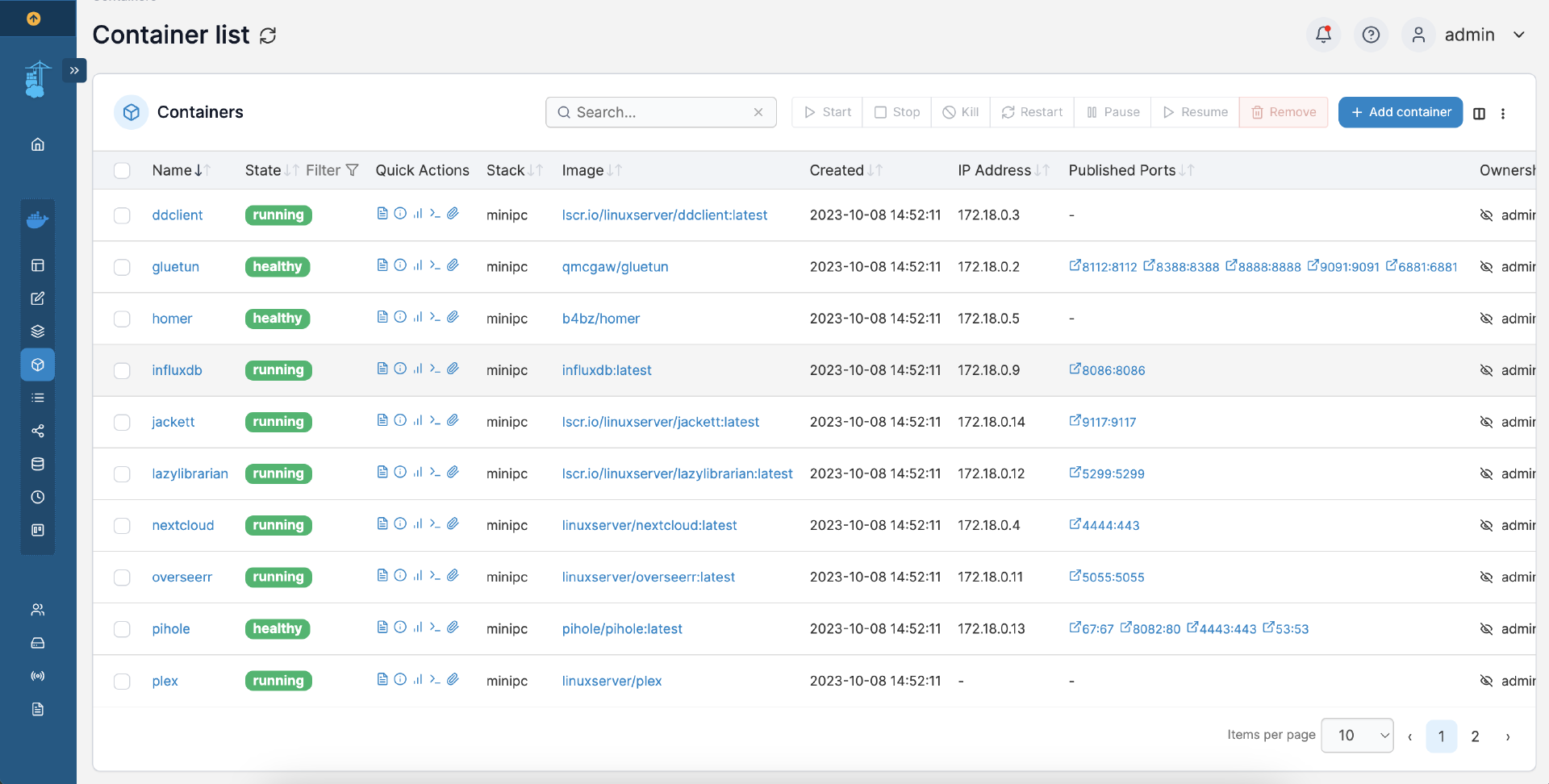
Configuring network access
Now that all the services are running as desired, I wanted to do 3 things:
- remote access to the server (while not exposing SSH ports)
- remote access to the services via HTTPS
- HTTPS authentication via some form of authentication provider (probably Github or similar)
Remote access via Tailscale
I have been using Tailscale for a while now and it’s a great way to get access to my systems without having to expose ports.
yay -S tailscale
sudo systemctl enable --now tailscaled
sudo tailscale up --operator=pascalwhoop
tailscale loginAnd I was up and running
Remote access to services via HTTPS
This one was a bit harder as I had to expose the services all behind a traefik reverse proxy. I had to do a bit of reading to get this right. Essentially I wanted to leverage a reverse proxy (traefik) to expose all my services via HTTPS. I also wanted to have a single point of authentication for all services. However, some services (like nextcloud) cannot be protected via an additional authentication layer, else the native clients will not work. So I ultimately decided to, for now, leverage BASIC auth for all services that I do not believe have solid security and keep the remaining services exposed through their native interfaces.
One additional layer of security is that none of my services show up on websites like
shodan.io. The reason is that many of my services are exposed via subdomains or
subpaths. However, the subdomains are not registered in DNS. Instead, I use the host
filter in traefik to route the requests to the correct backend service. This allows me to
do something like cloud.dkj4fkj.curiloo.com and have it route to my nextcloud instance.
People always criticise security through obscurity but I am a strong believer in not
being the lowest hanging fruit. Of course the first nextcloud instances that get hacked
are the ones that are easily discoverable.
Fixing rogue interrupts
OK so few days in, my services are running smoothly but I noticed my server constantly had a high baseload of 10-20% CPU usage.
When looking closer, I noticed that one core in the CPU was basically running at 100% all the time.
However when looking at htop or top I couldn’t see any process that was causing this.
I found two posts online
(1,
2) that reported similar issues. However they were not of much help.
Finally I found this arch forum conversation mentioning watch -n.5 cat /proc/interrupts which quickly showed the culprit being
Every 0.5s: cat /proc/interrupts homeserver: Sun Oct 15 18:22:10 2023
CPU0 CPU1 CPU2 CPU3
1: 9 0 0 0 IR-IO-APIC 1-edge i8042
...
16: 0 0 0 2 IR-IO-APIC 16-fasteoi i801_smbus
27: 0 2333178883 0 0 IR-IO-APIC 27-fasteoi idma64.0, i2c_designware.0As you can see in the last line, the i2c_designware.0 has a very large count of interrupts and it was increasing 20.000/second. Several posts then mentioned blacklisting a kernel module but which one?
This post suggested blacklisting intel_lpss_pci which I tried by
following the arch linux instructions on kernel modules. The command to verify this is the issue was simple
modprobe -r intel_lpss_pciThe result was instant.

To persist it I simply added the blacklist to my /etc/modprobe.d/blacklist.conf file
echo "blacklist intel_lpss_pci" > /etc/modprobe.d/no_lspss.confRunning a llama.cpp-python API server
At this point I wanted to get a bit more adventurous and try to run a LLM on this tiny machine. 6w TDP, that should be enough to run a state of the art LLM no? Well it turns out, it does run, although performance is not at all what one would expect. I get about ~ 1 token / second.
version: "3.9"
services:
local_ai:
image: quay.io/go-skynet/local-ai:v1.40.0
container_name: local_ai
tty: true # enable colorized logs
restart: always # should this be on-failure ?
ports:
- 8041:8080
env_file:
- stacks/localai/.env
volumes:
- ${DOCKER_ROOT}/localai/models:/models
- ${DOCKER_ROOT}/localai/images/:/tmp/generated/images/
command: ["/usr/bin/local-ai"]
big-agi:
image: ghcr.io/enricoros/big-agi:main
container_name: big-agi
ports:
- "3000:3000"
environment:
OPENAI_API_KEY: ${OPENAI_API_KEY}
OPENAI_API_HOST: ${OPENAI_API_HOST}
command: ["next", "start", "-p", "3000"]
labels:
- "traefik.enable=true"
- "traefik.http.routers.agi.rule=Host(`ai.dkj4fkj.curiloo.com`)"
- "traefik.http.routers.agi.entrypoints=https"
- "traefik.http.routers.agi.middlewares=myauth@file"
- "traefik.http.services.agi.loadbalancer.server.port=3000"This setup did allow me however to have a personal AI chatbot interface hosted on my machine and accessible from anywhere. It’s like a personal ChatGPT. I since then pivoted to a self-hosted version of typing mind which offers even more features, but I am strongly tempted to get a second, more powerful machine to run an LLM server, ensuring all my data stays on my machine.
Bitwarden / Vaultwarden
I finally also decided to pivot back from a fully file-based password management to a more
modern solution. I had been using pass for a while but
it was always cumbersome to use on phones. Dealing with sync issues of the git repo and the lack of a browser
extension also bothered me. When I learned that Bitwarden has the ability to auto-generate emails in the form of
<domain>@yourdomain.com I was sold. This way, each website has a unique email address and I can easily
track which website is selling my data. Also, it makes it harder for data vendors to link my data across websites.
I first had passbolt running but then decided to go with Bitwarden. However, the official Bitwarden docker image stack is a bit complex. They spin up a large number of containers and I wanted to keep it simple. So I decided to go with vaultwarden which is a community fork of Bitwarden, built in rust and being almost fully API compatible.
version: "3.9"
services:
# docker run -d --name vaultwarden -v /vw-data/:/data/ --restart unless-stopped -p 80:80 vaultwarden/server:latest
vaultwarden:
image: vaultwarden/server:latest
container_name: vaultwarden
env_file:
- stacks/vaultwarden/.env
volumes:
- ${DOCKER_ROOT}/vaultwarden:/data/
ports:
- 8233:80
restart: unless-stopped
labels:
- "traefik.enable=true"
- "traefik.http.routers.vaultwarden.rule=Host(`vault.dkj4fkj.curiloo.com`)"
- "traefik.http.routers.vaultwarden.entrypoints=https"
- "traefik.http.services.vaultwarden.loadbalancer.server.port=80"Conclusion
I am very happy with my new homeserver. It’s a great little machine that is still extremely potent. 6w TDP, after a few HDD upgrades 16TB of storage and currently running !21! docker containers. I can share my media library with my family and I already have so many more plans for it. The best thing is, thanks to DynDNS, this server is both accessible worldwide and easily portable. Next time I move, I simply take it with me and plug it in, configure port forwarding on my new router and I am good to go.
It also shows that you do not need $2000 in cloud bills to host a few services. I have over a dozen of services running, including video, audio, text, file sync, password management, monitoring, and more. All of this for less than $10/month in electricity costs and on a machine that cost around $150.